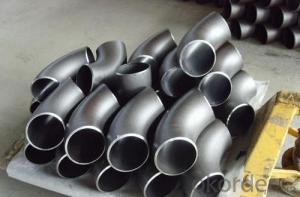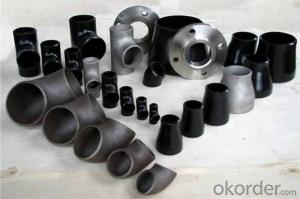CARBON STEEL PIPE FITTINGS ASTM A234 BEND FLANGE
- Loading Port:
- Tianjin
- Payment Terms:
- TT OR LC
- Min Order Qty:
- 1 m.t.
- Supply Capability:
- 30000 m.t./month
OKorder Service Pledge
OKorder Financial Service
You Might Also Like
Specifications
1.we produce seamless steel pipe
2.size:48-219*4.5-45mm
3.ISO 9000 approved
4.Market:south/east Asia,Mid-east,South America
seamless steel pipe
Material J55 K55 N80 L80 P110.etc
Standard ASTM JIS
Usage conveying oil gas ,oil pipe line,pipe material collar,oil nature gas,
Packing wooden cases or wooden pallet ,export standard package
Others:Special design available according to requirement
Anti-corrosion available and high temperature resistence
Delivery time 30days
Payment term T/T L/C
Name | API oil casing pipe | ||||
Out Diameter | Wall thickness | Material | Thread | Length | |
in | mm | ||||
5 1/2 | 139.7mm | 6.20 | J55/K55/N80 | LTC/STC/BTC | R2 |
6.98 | |||||
7.72 | |||||
9.17 | |||||
10.54 | |||||
6 5/8 | 168.28mm | 7.32 | J55/K55/N80 | LTC/STC/BTC | R2 |
8.94 | |||||
10.59 | |||||
12.06 | |||||
12.06 | |||||
8 5/8 | 219.08 | 8.94 | H40 | S/L/B | 9 5/8R2 |
J55/K55 | S/L/B | ||||
10.6 | L80 | L/B | |||
12.7 | L80 C95 | L/B | |||
14.15 | P110 | L/B | |||
9 5/8 | 244.48 | 13.84 | J55 K55 | R2 | |
15.11 | L80 | L/B | |||
10 3/4 | 273.05 | 11.43 | J55 K55 | S/B/E | R2 |
13.84 | P110 | S/B | |||
15.11 | P110 | S/B | |||
11 3/4 | 298.45 | 12.19 | J55 K55 | S/B | R2 |
10.96 | J55 K55 | S/B | |||
13 3/8 | 339.72 | 12.19 | J55 K55 L80 | S/B | R2 |
10.92 | J55 K55 | S/B | |||
13.06 | L80 | S/B | |||
Coupling and thread can be required according to customer requirment
- Q:Can steel pipes be used for underground drainage?
- Yes, steel pipes can be used for underground drainage. Steel pipes are commonly used for underground drainage systems due to their durability, strength, and resistance to various elements, such as soil erosion, chemical corrosion, and high pressure. However, it is important to consider factors like the type of soil, environmental conditions, and the specific requirements of the drainage system before deciding on the material for underground drainage pipes.
- Q:How are steel pipes protected against external moisture?
- Steel pipes are protected against external moisture through a variety of methods. One common method is the application of a protective coating or paint on the surface of the pipes. This coating acts as a barrier, preventing moisture from coming into direct contact with the steel. The coating can be made of different materials, such as epoxy, polyethylene, or zinc, depending on the specific requirements and environment. Another method of protection is through the use of corrosion inhibitors. These inhibitors are added to the internal or external surfaces of the pipes, forming a protective layer that prevents moisture from causing corrosion. Corrosion inhibitors can be in the form of chemicals, such as rust converters or rust preventatives, which react with the steel to form a protective barrier. Additionally, steel pipes can be protected against external moisture through cathodic protection. This technique involves the use of sacrificial anodes or impressed current to create an electric current that protects the steel. Sacrificial anodes, typically made of zinc, aluminum, or magnesium, are attached to the steel pipes and corrode over time instead of the steel, thus preventing moisture-induced corrosion. Furthermore, proper insulation and waterproofing measures are crucial in protecting steel pipes from external moisture. Insulation materials, such as foam or tape, are applied to the pipes to provide an additional layer of protection and prevent moisture infiltration. Waterproofing measures, such as the use of sealants or membranes, can also be implemented to ensure that no moisture seeps into the pipes. Regular maintenance, including inspections and repairs, is essential to ensure the continued protection of steel pipes against external moisture. By promptly addressing any areas of damage or corrosion, the integrity of the protective measures can be maintained, prolonging the lifespan of the steel pipes and preventing costly repairs or replacements in the future.
- Q:Can steel pipes be used for compressed air systems?
- Yes, steel pipes can be used for compressed air systems. Steel pipes are commonly used in industrial applications due to their high strength and durability. They can withstand the pressure and temperature variations associated with compressed air systems, making them a suitable choice for such applications.
- Q:What are the different types of supports used for underground steel pipes?
- There are several types of supports used for underground steel pipes, including concrete encasement, pipe saddles, bell and spigot joints, thrust blocks, and hangers. These supports help to distribute the weight of the pipe, provide stability, and prevent excessive movement or damage.
- Q:Can steel pipes be used for conveying natural gas?
- Certainly, natural gas can indeed be transported through steel pipes. In reality, steel pipes are frequently employed for this task owing to their robustness, long-lasting nature, and capacity to endure elevated pressures. Moreover, steel pipes exhibit exceptional resistance to corrosion, a vital feature when conveying natural gas containing impurities such as water and sulfur compounds. Furthermore, connecting various parts of the pipeline becomes effortless with steel pipes, thanks to their ease of welding. All in all, when it comes to conveying natural gas, steel pipes emerge as a trustworthy and secure option.
- Q:What is the difference between steel pipe and aluminum pipe?
- The main difference between steel pipe and aluminum pipe lies in their composition and properties. Steel pipe is made primarily of iron and carbon, with other elements added to enhance its strength and durability. It is known for its high tensile strength, resistance to corrosion, and ability to withstand high temperatures and pressure. On the other hand, aluminum pipe is made from aluminum, which is a lightweight metal known for its excellent corrosion resistance, thermal conductivity, and malleability. While steel pipe is generally stronger and more rigid, aluminum pipe is lighter and more easily manipulated. Additionally, steel pipe is often used in applications where strength and durability are critical, such as in construction and plumbing, while aluminum pipe is commonly used in industries that require lightweight materials, such as aerospace and automotive.
- Q:How are steel pipes used in the petrochemical industry?
- Steel pipes are widely used in the petrochemical industry for transporting and distributing various fluids and gases. They are particularly valuable for their durability, strength, and resistance to corrosion, which is crucial when dealing with highly corrosive substances. Steel pipes are employed in various processes such as refining, oil and gas production, chemical manufacturing, and transportation of petrochemical products. Whether it's conveying raw materials, transferring processed products, or supporting infrastructure, steel pipes play a vital role in ensuring the safe and efficient operation of the petrochemical industry.
- Q:What is the typical diameter range of steel pipes?
- The diameter of steel pipes can vary depending on factors such as the intended use, industry standards, and project requirements. Generally, steel pipes come in a wide range of diameters to cater to different needs. Typical sizes can range from small diameters of approximately 0.5 inches (12.7 mm) to larger diameters of several feet or more. This wide range allows for various applications, including plumbing, oil and gas transportation, structural support, and industrial processes. Ultimately, the diameter of a steel pipe will be determined by the specific requirements of the project or application.
- Q:How are steel pipes used in the construction of gas distribution networks?
- Steel pipes are commonly used in the construction of gas distribution networks due to their durability, strength, and ability to withstand high pressure. These pipes are used to transport natural gas from the source to homes, businesses, and industries. The steel pipes are laid underground and connected using fittings and valves to create a network that efficiently distributes gas. It ensures a safe and reliable delivery of gas to consumers while minimizing the risk of leaks or accidents.
- Q:How are steel pipes used in agriculture?
- Steel pipes are widely used in agriculture for various purposes. One common application is irrigation systems. Steel pipes can be used to transport water from a water source, such as a well or a reservoir, to different areas of a farm. These pipes are durable and can withstand the pressure of water, making them ideal for long-distance water transportation. Additionally, steel pipes are also used for drainage systems in agriculture. They can be used to remove excess water from fields, preventing waterlogging and ensuring proper drainage. Steel pipes are resistant to corrosion, which is important in agricultural settings where they may be exposed to moisture and various chemicals. Moreover, steel pipes are used in the construction of greenhouse structures. They provide structural support for the greenhouse framework and allow for the installation of irrigation systems and other equipment. Steel pipes are strong, sturdy, and can withstand harsh weather conditions, making them suitable for greenhouse construction. Furthermore, steel pipes are utilized in livestock farming. They are commonly used to create fences and enclosures for animals, providing a secure and durable barrier. Steel pipes are also used in the construction of animal shelters and barns. In summary, steel pipes play a crucial role in agriculture. They are used for irrigation systems, drainage systems, greenhouse construction, and livestock farming. Their durability, strength, and resistance to corrosion make them an excellent choice for various agricultural applications.
1. Manufacturer Overview |
|
|---|---|
| Location | |
| Year Established | |
| Annual Output Value | |
| Main Markets | |
| Company Certifications | |
2. Manufacturer Certificates |
|
|---|---|
| a) Certification Name | |
| Range | |
| Reference | |
| Validity Period | |
3. Manufacturer Capability |
|
|---|---|
| a)Trade Capacity | |
| Nearest Port | |
| Export Percentage | |
| No.of Employees in Trade Department | |
| Language Spoken: | |
| b)Factory Information | |
| Factory Size: | |
| No. of Production Lines | |
| Contract Manufacturing | |
| Product Price Range | |
Send your message to us
CARBON STEEL PIPE FITTINGS ASTM A234 BEND FLANGE
- Loading Port:
- Tianjin
- Payment Terms:
- TT OR LC
- Min Order Qty:
- 1 m.t.
- Supply Capability:
- 30000 m.t./month
OKorder Service Pledge
OKorder Financial Service
Similar products
New products
Hot products
Related keywords






























